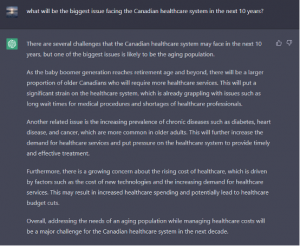Looking at ChatGPT

By Bhargavi Venkataraman
What is ChatGPT?
ChatGPT, according to its own engine, is “an AI-powered chatbot developed by OpenAI, based on the GPT (Generative Pretrained Transformer) language model. It uses deep learning techniques to generate human-like responses to text inputs in a conversational manner.” It was initially developed by the San Francisco-based startup known as OpenAI, co-founded by Elon Musk and Sam Altman. It is an example of generative AI, tools that accept written prompts imputed by users to generate human-like text, images and videos.
Since ChatGPT was released in November 2022, it has attracted a lot of headlines, both positive and negative. There is a side saying that it could improve the idea of work by assisting us with mundane and complicated tasks. There is another side saying that this type of artificial intelligence could impinge into dangerous territory that is more suitable to be handled by sentient beings. Nevertheless, it is clear that there are both positives and negatives to the tool.
Pros
Efficient: One of the main appeals of using this tool is how quick and relatively accurate it is, especially in certain areas. For example, it is particularly good at routine or perfunctory tasks. A common application for it is customer service. It can react in real-time to customer requests and use data about customers to provide personalized responses, all with reduced wait times. Theoretically, this might allow human employees to focus on more complicated tasks, maintaining customer satisfaction and increasing productivity on the whole.
Relatively accessible: The engine is trained to respond to multiple languages, enabling it to have a global reach. Further, it is free to use, so people of various demographics are able to benefit from it. People in many spheres, including academics, business, medicine, etc., are utilizing the tool to their benefit.
Could spark innovation: Due to the quickness of the engine and how much information it has access to, this is a good tool to spark a rapid exchange of ideas and potentially propel innovation. I recently used ChatGPT when I was prepping for some interviews and wanted to get different perspectives on ethical dilemmas or world issues. I can also see this working well in wanting to gather different sides to a controversial topic or debate quickly. Although the accuracy of the engine might be questioned in conversational scenarios where there might not be a correct answer and you are just trying to spark discussion, ChatGPT could be a very useful tool. Here is an example of a question I asked ChatGPT about a world issue and how it responded:

Cons
Inaccurate: This is a relatively new tool, and thus, it is still learning. There are many topics on which it makes mistakes. It also doesn’t do very well with obtaining information after 2021. One area in which it makes a lot of mistakes is in math. I have tried to input math questions into it, and it sometimes completely makes up information and defies mathematical principles.
Ethical Issues/Plagiarism: Particularly within the academic sphere, this is a large reason why there is distrust regarding the use of ChatGPT. Many times, students attempt to use ChatGPT to cheat on exams or written assignments. This is an obvious breach of academic integrity. Nowadays, institutions have to make extra efforts to surveil work and ensure it isn’t done using AI. Additionally, ChatGPT does not do a good job of crediting or citing people’s work. This means using the engine to do work is often unethical. This, in addition to the inaccuracy, it could spread misinformation to vulnerable populations, which could be extremely problematic.
World Domination: I know this might be dramatic wording, but this is one of the biggest fears with AI, especially with one as advanced as ChatGPT. The worry is that the engine would take over many jobs and remove the need for human employees. Even with the customer service example I gave above, allowing ChatGPT to take over rote customer answering calls replaces thousands of employees who do the job currently. Content creators online are fighting back against this by incorporating ChatGPT into their work. For example, chefs are using the engine to generate viral recipes and testing them out. Right now, they are finding that the tool is not very good for these jobs, but many believe it is only a short time before it will be.
All in all, ChatGPT is a rapidly learning and highly advanced tool that currently has a wide variety of uses. It is a very exciting development in this technological revolution, but not everyone is convinced that it is a good thing. There are a lot of ways in which the engine could be used to increase productivity and support current jobs, but there is a lot of fear about its current inaccuracy and future ability to affect jobs done by humans. I would urge all of you to try it out for fun, be mindful of its limitations and keep a watch out for how it will develop in the future.





Leave a comment!